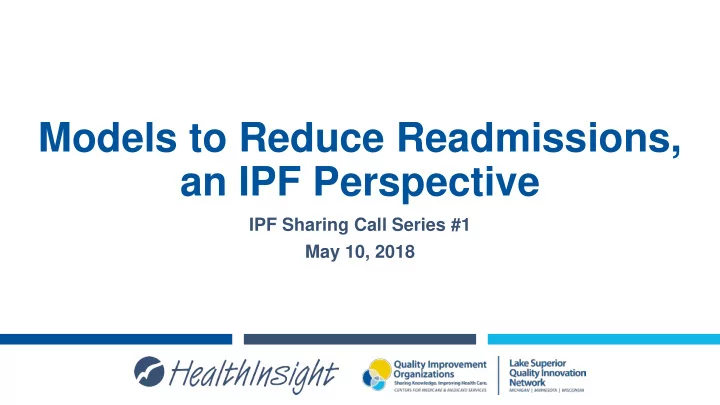

Models to Reduce Readmissions, an IPF Perspective IPF Sharing Call Series #1 May 10, 2018
Lake Superior QIN HealthInsight
Objectives • Highlight key interventions Inpatient Psychiatric Facilities (IPFs) can use to reduce readmissions • Stimulate discussion on barriers and successes in the IPF setting • Foster cross-collaboration between IPFs across the country
Common Core Components Timeline RARE Components Project RED Bridges Model Review patient information Patient / Family Engagement Confer w/ medical team Patient Engagement • During Stay Educate patient and family or caregivers. • Educate the patient and caregivers Assessment of patient needs (Teach Back) Review how to respond to problems (teach back) Medication Management • Medication reconciliation at each transition of Identify correct medications Coordinated Care Confirms medication plan care • Ongoing assessment of patient needs • Patient educated re medications. (teach back) Follow up on labs • Address special populations Transition Planning • Provide a written patient centered transition Create after hospital care plan Primary Care Integration plan Organize post discharge services and equipment Use of Community Resources Transition / • Identify a crisis management plan Makes post-discharge follow up appointments • Establish plan of care collaboration Discharge Transition Communication Provides patient w/ written discharge plan, teaches • Provide referrals to community resources • Educate patient and family on care transition them the plan and assesses their understanding of Process • Educate caregiver on community providers the AHCP. resources • Notify primary care and mental health providers Transmits discharge summary • Send discharge summary Use of Community Resources Post Discharge Transition Care Support Calls to reinforce discharge plan within 48 to 72 hrs. • Contact patient and caregivers • Contact the patient within 72 hrs. Staff the patient help line Support • 2 day, 2 wk. and 30 day assessments
During the Stay During the Stay Patient / Family Engagement RARE • Educate patient and family or caregivers (teach back) Medication Management • Medication reconciliation at each transition of care • Patient educated re medications (teach back) • Address special populations • Review patient information Project • Confer w/ medical team RED • Educate the patient and caregivers • Review how to respond to problems (teach back) Patient Engagement Bridges Coordinated Care Model • Assessment of patient needs
Transition / Discharge Process Transition / Discharge Process Transition Planning RARE • Provide a written patient centered transition plan • Identify a crisis management plan Transition Communication • Educate patient and family re care transition providers • Notify primary care and mental health providers • Send discharge summary • Identify correct medications / confirms medication plan Project RED • Follow up on labs • Create after hospital care plan, provide patient w/ written discharge plan, teaches them the plan and assesses their understanding of the plan. • Organize post discharge services and equipment / make post-discharge follow-up appointments • Transmits discharge summary Primary Care Integration Bridges Use of Community Resources Model • Establish plan of care collaboration • Provide referrals to community resources • Educate caregiver on community resources
Post Discharge Support Post Discharge Support RARE Transition Care Support • Contact the patient within 72 hrs. • Calls to reinforce discharge plan within 48 to 72 hrs. Project RED • Staff the patient help line Bridges Model Use of Community Resources • Contact patient and caregivers • 2 day, 2 wk. and 30 day assessments
IPF Sharing Call Series #2 | Risk Stratification and Integrated Care Perspectives in IPF Work Thursday, May 31 | 1-2 p.m. E.T., 12-1 p.m. C.T., 11 a.m.-12 p.m. M.T., 10-11 a.m. P.T. HealthInsight will present the READMIT clinical risk index tool that Intermountain Healthcare uses to help identify patients who may be at increased risk for a readmission within 30 days of discharge. www.LSQIN.org/event/ipfsharingcall2
Thank You! HealthInsight.org | @HealthInsight Lsqin.org | @LakeSuperiorQIN This material was prepared by Lake Superior Quality Innovation Network, under contract with the Centers for Medicare and Medicaid Services (CMS), an agency of the U.S. Department of Health and Human Services. The materials do not necessarily reflect CMS policy. 11SOW-MI/MN/WI- G1-18-27 042518
Recommend
More recommend